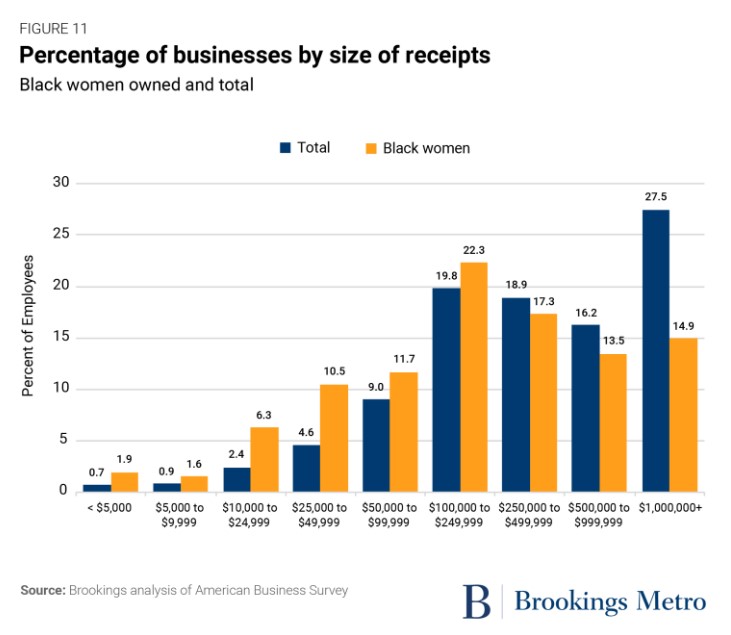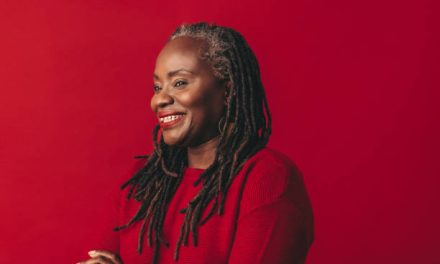
By Bria Overs,
Word in Black
There’s an underappreciated power in Black businesses. A power that goes beyond their ability to boost the United States economy. From cultural-changing fashion brands to construction companies to hair salons, Black-owned businesses have a profound impact on the Black community.
The heart of that impact? The ability to generate prosperity that could help close the racial wealth gap.
And Black-women business owners are leading the charge, increasing their numbers to 52,374 businesses in just three years, according to a report from the Brookings Institute.
This boost is despite a lack of access to capital, expensive student loan debt, the COVID-19 pandemic and historical traumas around Black business ownership.
Most Black-owned businesses are solo endeavors and are 12.7 percent of all non-employer companies, $83.6 billion in revenue. Zooming in, the Pew Research Center found that men owned 55 percent of Black businesses, while Black women owned 37 percent, and 8 percent had equal male-female ownership.
“We know that Black people aren’t lower in their entrepreneurial spirit,” Andre Perry, senior fellow at Brookings Metro and a co-author of the report, said. “We have people who want to start businesses, but they’re certainly not capitalized or incentivized to do so.”
While the entrepreneurial spirit is alive in Black communities, only 3 percent of those owned by Black women maturate or last beyond five years. But Black folks need these businesses to survive and thrive.
If growth stays at its current rate and significant gaps in established businesses persist, reaching equality with the number of Black people will take about 256 years. Brookings’s report claims this will leave the racial wealth gap entrenched.
For example, in Atlanta there are about 8,663 Black businesses, accounting for 7.4 percent of employer businesses. If Black businesses accounted for 36.3 percent of companies with employees, which is equivalent to the Black population, there would be 57,796 more Black businesses for a total of 66,459.
“The goal of our report is not just to point to the economic benefits of business ownership,” Perry said. “It’s about self-determination, agency, and community development, not just building more capitalists. It’s to give agency to people who were historically denied opportunities.”
State of the Black women-owned businesses
The COVID-19 pandemic, and the murder of George Floyd within that, certainly affected Black business owners. This chain of events caused an unexpected boom in business says Nikki Porcher, founder of the non-profit Buy From A Black Woman. Though significant support flowed in, Black business owners say it didn’t last.
“Because there was such an influx in the last part of [2020], they were starting to prepare thinking that would be the norm and now it’s dwindling,” said Porcher. “The people who were excited to buy Black and support Black women and businesses are now getting ally fatigue.”
With a shift like this, it’s difficult for their companies to maintain operations and achieve goals. And that’s necessary, if Black businesses are to have the kind of impact on their families and communities that they hope to have.
The Brookings report found that in 2020, Black business owners employed 1.3 million people, created 48,549 new jobs and added $1.7 billion in aggregate payroll to the economy.
Going from being a solopreneur to an official business that can afford employees is a wall to get over for Black businesses– especially for Black women.
Black women and their companies account for slightly less than 1 percent of all American employer businesses, bringing in 0.3 percent of overall revenue in the U.S., according to Brookings. This means there aren’t enough Black women offering employment opportunities.
Part of the problem is most of these companies are stuck in certain revenue brackets. The largest share of Black women’s businesses have mid-level revenues between $100,000 and $250,000 per year. Less than 15 percent make more than $1 million each year.
The report also found that Black women are “over-represented in the lowest earning categories” of $50,000 or less annually.
Porcher said the rapid change in revenue and transactions over the years is a new challenge for founders and owners.
Pushing Black women further
Black women do and continue to face a lot of adversity on their path to reaching entrepreneurial goals. High-interest rates, inflation, and the restarting of student loan payments will affect owners and consumers alike.
“Anything which is constraining the wealth, or creating additional debt is going to have a negative outcome on those individuals, households, and communities they’re part of, which includes all of those businesses,” Manann Donoghoe, senior research associate at Brookings Metro and fellow report co-author, said.
Porcher said there are still easy ways to support these businesses and their founders, including swapping out everyday items to Black-owned or supporting organizations that help these companies.
For owners and founders, she said, consider starting businesses with unique ideas and customers. Because while there might be room at the table, it’s also beneficial to uplift existing companies and firms.
“Whenever you see one Black woman, you’re not just seeing ,” Porcher said. “She has a whole community that she’s standing in for, standing up for, and standing with. It doesn’t just stop with her.”
This article was originally published by Word In Black.
The post Bringing staying power to the Black women-owned business boom appeared first on AFRO American Newspapers .











